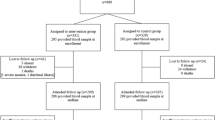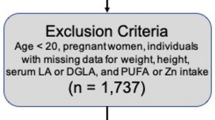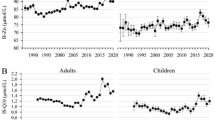Abstract
Background:
Adjustments in intestinal absorption and losses of zinc (Zn) are thought to maintain Zn homeostasis when dietary intake levels are altered. Zn status may also influence efficiency of intestinal Zn absorption.
Objectives:
To determine the impact of dietary intake and status of some micronutrients on Zn absorption in late middle-aged men.
Design and participants:
Dietary intake and status of Zn, Cu, Fe, vitamin A, C and fibre, and absorption of Zn were measured in 48 men, aged 58-68 y, confined to a metabolic unit and consuming a typical French diet. Dietary intake was estimated using 4-day food-intake records (including the weekend) and the GENI program. To assess Zn status, serum, erythrocyte, urine Zn levels and serum alkaline phosphatase activity were determined. Zn absorption was determined using the isotope double-labelling method. Zn stable isotopic ratios were measured in plasma samples collected before and 48 h after isotope administration using ICP/MS.
Results:
Zn intake within the group of men varied from 5.7 to 20.5 mg/day and averaged 12.9 mg/day. Serum Zn level varied from 10 to 18 μmol/l and averaged 12.9 μmol/l. Zn absorption varied from 12 to 46% and averaged 29.7%. Zn absorption was not significantly (P>0.05) correlated with Zn intake or with any of the Zn status parameters. Zn absorption was only slightly negatively correlated with serum and erythrocyte Zn levels and with serum Fe and ferritin levels in this study.
Conclusion:
Zn dietary intake and Zn absorption were satisfactory and led to an adequate Zn status in this population.
Sponsorship:
The ZENITH Study is supported by the European Commission ‘Quality of Life and Management of Living Resources’ Fifth Framework Program, Contract No: QLK1-CT-2001-00168.
This is a preview of subscription content, access via your institution
Access options
Subscribe to this journal
Receive 12 print issues and online access
$259.00 per year
only $21.58 per issue
Buy this article
- Purchase on Springer Link
- Instant access to full article PDF
Prices may be subject to local taxes which are calculated during checkout


Similar content being viewed by others
References
Abdulla M, Behbehani A & Dashti H (1989): Dietary intake and bioavailability of trace elements. Biol. Trace Elem. Res. 21, 173–178.
Andriollo-Sanchez M, Hininger-Favier I, Meunier N, Toti E, Zaccaria M, Brandollini-Bunlon M, Polito A, O'Connor JM, Ferry M, Coudray C & Roussel AM (2005): Zinc intake and status in middle-aged and older European subjects. The ZENITH study. Eur. J. Clin. Nutr. 59, S37–S41.
Ducros V, Arnaud J, Tahiri M, Coudray C, Bornet F, Bouteloup-Demange C, Brouns F, Rayssiguier Y & Roussel AM (2005): Influence of short-chain fructo-oligosaccharides (sc-FOS) on absorption of Cu, Zn, and Se in healthy postmenopausal women. J. Am. Coll. Nutr. 24, 30–37.
Fairweather-Tait SJ & Dainty J (2002): Use of stable isotopes to assess the bioavailability of trace elements: a review. Food Addit. Contam. 19, 939–947.
Favier JC, Ireland-Ripert J, Toque C & Feinberg M (1995): Répertoire général des aliments, 2ème ed. Paris: Inra-Cneva/Ciqual ed.
Galal OM (2000): Micronutrient deficiency conditions in the Middle East region: an overview. Public Health Rev. 28, 1–12.
Gibson RS & Ferguson EL (1998): Assessment of dietary zinc in a population. Am. J. Clin. Nutr. 68, 430S–434S.
Giles L, Smiciklas-Wright H, Fosmire G & Derr J (1994): Variations in plasma zinc in older men and women. Biol. Trace Elem. Res. 41, 235–243.
Hambidge KM, Krebs NF & Miller L (1998): Evaluation of zinc metabolism with use of stable-isotope techniques: implications for the assessment of zinc status. Am. J. Clin. Nutr. 68, 410S–413S.
Hill T, Meunier N, Andriollo-Sanchez M, Ciarapica D, Hininger-Favier I, Polita A, O'Connor JM, Coudray C & Cashman KD (2005): The relationship between the zinc nutritive status and biochemical markers of bone turnover in older European adults. The ZENITH study. Eur. J. Clin. Nutr. 59, S73–S78.
Hotz C, Lowe NM, Araya M & Brown KH (2003): Assessment of the trace element status of individuals and populations: the example of zinc and copper. J. Nutr. 133, 1563S–1568S.
Johnson PE, Hunt CD, Milne DB & Mullen LK (1993): Homeostatic control of zinc metabolism in men: zinc excretion and balance in men fed diets low in zinc. Am. J. Clin. Nutr. 57, 557–565.
King JC (1986): Assessment of techniques for determining human zinc requirements. J. Am. Diet. Assoc. 86, 1523–1528.
King JC, Shames DM & Woodhouse LR (2000): Zinc homeostasis in humans. J. Nutr. 130, 1360S–1366S.
Krebs NF (2000): Overview of zinc absorption and excretion in the human gastrointestinal tract. J. Nutr. 130, 1374S–1377S.
Le Moullec N, Deheeger M, Preziosi P, Monteiro P, Valeix P, Rolland-Cachera MF, Potier de Gourcy G, Christides JP, Galan P & Hercberg S (1996): Validation du manuel-photos utilisé dans l'enquête alimentaire de l'étude SU.VI.MAX. Cah. Nutr. Diét. 31, 158–164.
Lonnerdal B (2000): Dietary factors influencing zinc absorption. J. Nutr. 130, 1378S–1383S.
Prasad AS (1985): Clinical and biochemical manifestations of zinc deficiency in human subjects. J. Am. Coll. Nutr. 4, 65–72.
Prasad AS (1998): Zinc in human health. J. Trace Elem. Exp. Med. 11, 63–87.
Sandstrom B (1995): Consideration in estimates of requirements and critical intake of zinc. Adaption, availability and interactions. Analyst 120, 913–915.
Sian L, Mingyan X, Miller LV, Tong L, Krebs NF & Hambidge KM (1996): Zinc absorption and intestinal losses of endogenous zinc in young Chinese women with marginal zinc intakes. Am. J. Clin. Nutr. 63, 348–353.
Vallee BL & Falchuk KH (1993): The biochemical basis of zinc physiology. Physiol. Rev. 73, 79–118.
Werner E, Roth P, Hollriegl V, Hansen C, Kaltwasser JP, Giussani A, Cantone MC, Greim H, Zilker T & Felgenhauer N (2002): Assessment of intestinal absorption of trace metals in humans by means of stable isotopes. Isotopes Environ. Health Stud. 38, 23–31.
Acknowledgements
We acknowledge the assistance of L Morin, N Mathieu and G Manlhiot from the Human Nutrition Unit of Clermont-Ferrand in caring for the study subjects. They also thank Drs S Corny and V Miranda from the Clermont-Ferrand Hospital pharmacy for preparing the stable isotopes for human use, and E Gueux, L Jaffrelo and S Thien for technical assistance.
Author information
Authors and Affiliations
Corresponding author
Additional information
Guarantor: C Coudray.
Contributors: NM recruited Zenith subjects, CFC handled the results, MAS contributed to Zn measurement, MR performed stable isotope determination, MB determined dietary intakes, SJC Cupper measurement, KDC performed analysis of urinary creatinine and manuscript correction, CC performed study design and paper writing and coordinated ZENITH Study. All authors read and contributed to finalization of the manuscript.
Rights and permissions
About this article
Cite this article
Meunier, N., Feillet-Coudray, C., Rambeau, M. et al. Impact of micronutrient dietary intake and status on intestinal zinc absorption in late middle-aged men: the ZENITH study. Eur J Clin Nutr 59 (Suppl 2), S48–S52 (2005). https://doi.org/10.1038/sj.ejcn.1602298
Published:
Issue Date:
DOI: https://doi.org/10.1038/sj.ejcn.1602298
Keywords
This article is cited by
-
DNA binding and antitumor activities of zinc(II) complexes with some S-alkenyl derivatives of thiosalicylic acid
Transition Metal Chemistry (2019)
-
Zinc: dietary intake and impact of supplementation on immune function in elderly
AGE (2013)
-
Effect of zinc supplementation on vitamin status of middle-aged and older European adults: the ZENITH study
European Journal of Clinical Nutrition (2008)



